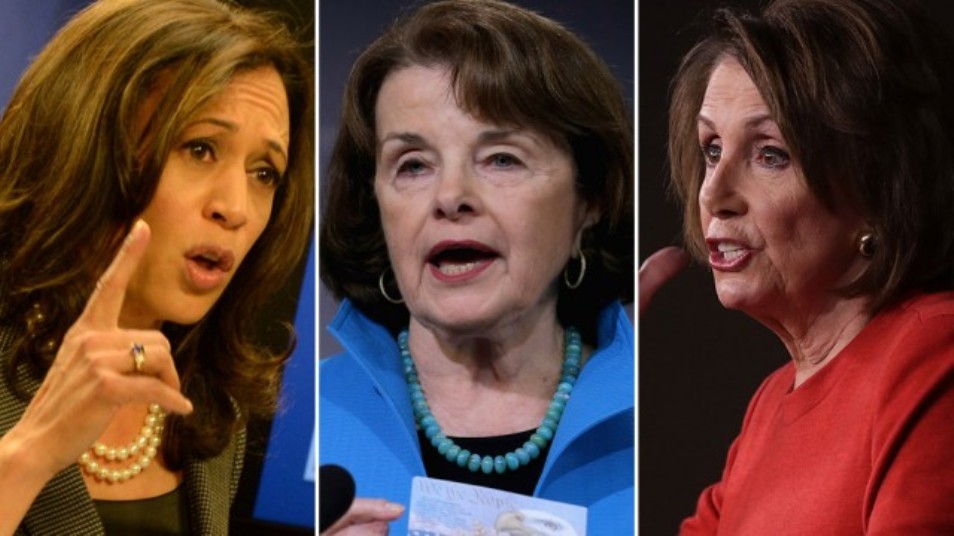
California becomes heart of anti-Trump resistance

California’s political leaders are gearing up to lead progressive resistance to President-elect Donald Trump.
The Golden State, where Hillary Clinton beat Trump by more than 4 million votes, is a center of political power for the left.
It’s the home of Silicon Valley and Hollywood, two industries that tilt to the left. By itself, the state makes up 13 percent of the nation’s GDP.
A powerful group of Democratic politicians call the state home, including both of the state’s senators, a liberal legend in Gov. Jerry Brown and the nation’s first and only female Speaker in Rep. Nancy Pelosi.
California
is also home to a growing Latino population, which means it will be
ground zero for Trump’s immigration agenda. About 40 percent of the
state’s population is Hispanic.
He said his state is ready to oppose Trump on federal policies that would hurt California, and on nominees such as Sen. Jeff Sessions, the Alabama Republican and immigration hardliner nominated to lead the Department of Justice.
Outgoing Rep. Xavier Becerra (D-Calif.), appointed earlier this month to succeed Sen. Kamala Harris as attorney general, will lead the local charge in California's immigration fight.
Becerra has already vowed to fight federal immigration enforcement in his new role through legislation and litigation.
"My sense is we’re not going to stop being California,” Becerra told The Hill. "We’ve got a very progressive group of leaders from Governor Brown, to our state legislative leaders [State Assembly Speaker] Anthony Rendon, to [State Senate President] Kevin de Leon.”
California mayors have also pledged to resist aggressive immigration enforcement. Los Angeles Mayor Eric Garcetti has been adamant in keeping L.A. as a sanctuary city, and he announced Monday a fund to defend immigrants from federal deportation action.
The state’s political leaders are signaling they will be a part of the resistance to Trump’s pick for attorney general. Sen. Dianne Feinstein, the 24-year California senator, will be the ranking Democrat next year on the Judiciary Committee, which will consider the Sessions nomination.
Becerra said all legal options are on the table when it comes to fighting to defend California's policies, including litigation and political action.
"We're gonna move, so long as we do things according to the U.S. and California constitutions, we're gonna move,” he said. "I think what makes it an interesting or changing dynamic is if someone tries to stop us from doing what we're by law allowed to do.”
Padilla, an outspoken voting rights advocate who already pushed through aggressive policies to expand California's voter registration, vowed to defend voting rights at a national level.
Turnout in California was 73.5 percent, the state's second-highest in history. It’s nearly 20 percent higher to the 54.4 percent who turned out to vote across the country, according to the United States Elections Project.
Some believe the higher turnout reflects the interest taken in the election by Hispanics who worried that if Trump won, he’d follow through on his promises to build a wall on the border and to start mass deportations.
Trump has complained about voter fraud in California, saying this contributed to his loss in the popular vote.
Some of Trump’s supporters have suggested illegal immigrants contributed to Clinton’s tally in the Golden State.
Padilla slammed Trump’s comments about fraud last month, saying they were unsubstantiated, reckless and unbecoming of a president-elect.
"It appears that Mr. Trump is troubled by the fact that a growing majority of Americans did not vote for him,” he said.
While Trump and California have been at odds — Trump supporters have noted he would have won the popular vote if the Golden State’s vote totals were excluded from the national vote — California politicians say they are willing to work with the president-elect where their interests aligned.
"If they take actions we approve of I’ll be the first to applaud,” Padilla said.
"As Leader Pelosi has mentioned, we will work and engage with the President-elect where we can,” Jorge Vargas, a spokesman for Pelosi, wrote in an email.
"However, House Democrats will confront where we must. We won’t stand idly by as Speaker [Rep. Paul ] Ryan (R-Wis.) and the Trump Administration attempt to attack Social Security and Medicare while at the same time assaulting the healthcare of 20 million Americans.”
With California as a progressive bulwark, the potential clash between the country's largest state and the federal government could pit the country's two largest bureaucracies against each other from opposite ends of the political spectrum on almost every issue.
But Kenneth Romero, executive director of the bipartisan National Hispanic Caucus of State Legislators, said the conflict is nothing new.
"It's not the first time a state resists federal policy,” he said.
He argued that California’s local leaders are likely to use a pillar of the GOP identity in making their case against Trump’s agenda: states rights.















